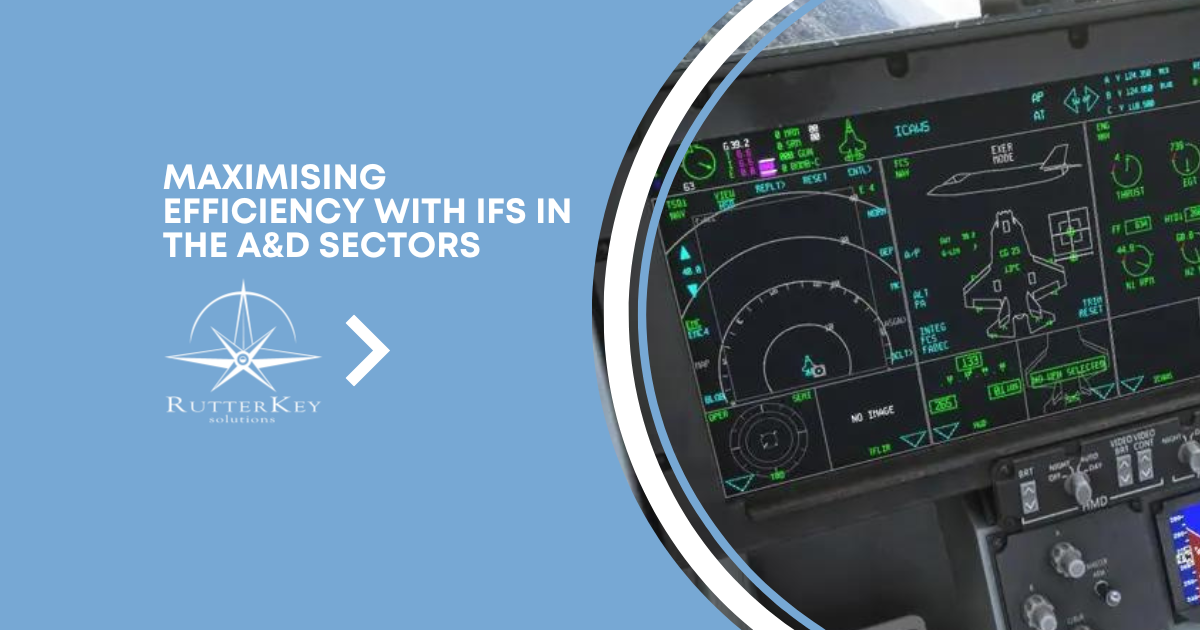
Maximising Efficiency with IFS in the Aerospace and Defence Sectors
February 1, 2023
Unlocking the Benefits of IFS for Infrastructure Projects
February 3, 2023IFS is a software solution for the construction industry, providing comprehensive project management and collaboration tools. It is designed to provide visibility into project performance and enable collaboration between project stakeholders.
IFS software helps construction companies streamline their project management processes and provide real-time insights into project performance. With IFS, construction companies can manage costs, maintain budgets, track progress, and collaborate with other project stakeholders.
IFS software provides a comprehensive suite of tools and features that help construction companies improve efficiency, reduce costs, and increase productivity.
An introduction to IFS
IFS software is a suite of enterprise resource planning (ERP) applications designed to help organizations manage their core business operations, such as finance, manufacturing, supply chain, customer service, and human resources.
It is an integrated platform that provides companies with a single view of their operations and data, enabling them to make informed decisions and optimize their processes. IFS software is used by enterprises across the world, from medium-sized, regional providers to large multinational corporations.
The growing role of software in the construction sector
The construction sector is increasingly relying on software to manage projects, improve efficiency, and increase accuracy. The software helps to streamline processes, from the planning stage to completion. It allows for better communication between stakeholders and offers improved project management capabilities.
The software can also help to improve quality control, as well as reduce costs. It can be used to generate reports and provide data on the progress of a project, enabling managers to make informed decisions in real-time. It can also be used to improve safety, as it can provide alerts for potential hazards or threats.
Finally, the software can be used to create 3D models of a project, allowing for more accurate planning and the ability to visualize the end product. This can be especially useful when working on large, complex projects.
5 Advantages of IFS in the construction sector
The following is a list of some of the most encountered benefits that construction companies experience as a result of successfully implementing IFS software into their organization.
1. Streamlined operations
IFS software can help streamline construction operations by automating processes, providing better visibility and control over operations, and improving collaboration.
2. Improved efficiency
IFS software can help construction companies improve efficiency by reducing manual processes, automating workflows, and providing real-time data and insights into operations.
3. Cost savings
IFS software can help construction companies save money by reducing manual processes, automating processes, and reducing the need for expensive manual labor.
4. Increased quality
IFS software can help construction companies increase the quality of their work by providing better visibility and control over operations, as well as enhanced collaboration.
5. Increased safety
IFS can increase safety within construction projects by helping to ensure that safety protocols are being followed. The software can be used to track safety inspections, monitor safety compliance, and generate reports on safety performance. The software can also help to identify areas of risk and suggest corrective action.
5 Challenges of using IFS in the construction sector
The following is a list of drawbacks that construction companies can come across when implementing IFS software into an organization.
1. Cost
Implementing IFS software in the construction sector can be expensive due to the need to purchase and install the software, as well as train staff to use it.
2. Complexity
IFS can be complicated to learn, especially for people with limited computer experience.
3. Change management
Making the transition from existing systems to a new IFS software system can be difficult, as it requires significant changes in processes and personnel.
4. Integration
Integrating IFS software into other existing systems and applications can be difficult, as well as costly.
5. Security
IFS software (like all software solutions) can be susceptible to security risks and can be vulnerable to malicious attacks.
Recommendations for successful implementation of IFS software in the construction sector
The following is a list of recommendations for ensuring the successful introduction of IFS into a construction company.
1. Research the software
It is important to research the software to understand its features and capabilities. This will help directors determine if IFS software is the right fit for a construction business.
2. Take time to understand the system
Spend time understanding the system and how it works. This will help senior managers create a plan for how IFS will be used in the business.
3. Choose the right implementation partner
Choose a reliable implementation partner who has experience in construction and understands the software. This will help ensure the implementation process goes smoothly. Get in touch with RutterKey Solutions to understand our comprehensive level of expertise in managing IFS implementations within the construction sector.
4. Train staff
Proper training is essential to ensure that internal staff members can use the software effectively. Make sure to provide adequate training to all staff members who will be using the software.
5. Monitor progress
Monitor the progress of the implementation process to ensure that it is going smoothly. Make sure to check in frequently with the implementation partner and staff members to ensure that everything is on track.
6. Test the software
Before deploying IFS, make sure to test it to ensure that it is working properly. This will help ensure that the software is functioning as it should be whilst insulating from any risk before the live launch.
7. Track performance
Once IFS is deployed, track the performance of the system to make sure that it is meeting the organization’s needs. This will help ensure that the system is working effectively and efficiently.
Choosing the right IFS implementation partner for a construction company
As mentioned in point 3 above, the right implementation partner can be the difference between success and failure for a construction company’s IFS transition. A good implementation partner will have a proven track record of successful IFS delivery with other companies in the construction sector and will have the necessary technical knowledge and experience to ensure projects are completed according to time and budget requirements.
A good partner will also have a thorough understanding of the specific industry and business processes for construction companies and be able to offer solutions tailored to industry best practices.
Finally, a good IFS implementation partner should provide ongoing maintenance and support services to ensure the system remains effective and up to date. Choosing the right partner is essential for a successful implementation.
Contact RutterKey Solutions today to explore our IFS experience and expertise in working with construction companies.
If you'd like to find out more about how IFS can be used in the Construction sector or how RutterKey can help unlock IFS' full potential in your organization, fill out the form below.


